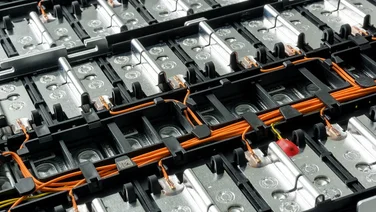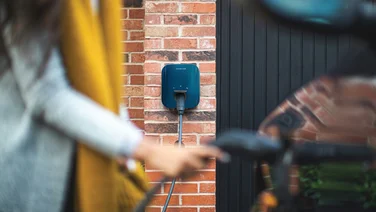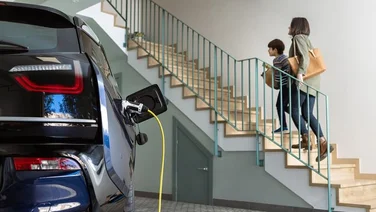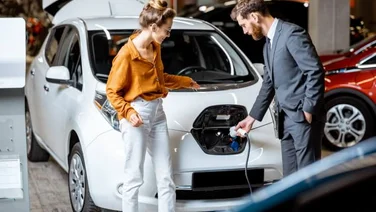We receive a small fee from trusted installers when you request a quote through our site. This helps us keep our content independent, well-researched and up to date – Learn more
For some, buying a new electric vehicle is just too much money. Thankfully, second-hand EVs are a good deal cheaper than buying new, and electric car charging point costs are extremely reasonable at the moment.
Get free EV charging point quotes
Answer a few quick questions, and our trusted installers will send you bespoke EV charging point quotes – for free.

The cost of second hand electric cars
Electric vehicles are, on average, more expensive than fuel-powered cars, with even the cheapest models on the market barely dipping below £15,000.
Second-hand electric cars on the other hand, can cost as little as £5,000 if you get a lucky find. That’s still a big price hike over many second-hand petrol or diesel cars, but as electric cars become more popular, they will become more affordable.
On average, the price for the cheapest electric cars is around £8,000–£10,000.
Here’s a breakdown of the costs for some of the most popular second-hand electric cars:
| Manufacturer | Model | Average price |
| Nissan | Leaf | £6,695 |
| Tesla | Model 3 | £35,000 |
| Renault | Zoe | £8,500 |
| Kia | Niro | £31,995 |
| BMW | i3 | £17,500 |

Even though we’ve been buying electric cars in the UK for almost two decades now, the technology is still relatively new.
Because of this, electric cars remain expensive. All the new hardware being used costs a lot of money to produce, so naturally the price of electric cars is higher than most petrol or diesel cars.
By far the biggest factor in the cost of electric cars is their batteries, which are made using lithium. Unfortunately an ongoing global lithium shortage is seeing prices per tonne of the stuff increasing enormously.
In turn, battery prices are skyrocketing. This is a worrying reversal of what car manufacturers have been betting on for years — that the cost per kilowatt hour (kWh) in a battery will continue to fall.
Just over a decade ago the cost per kWh for batteries was around £800; by 2021 this had fallen to between £100–£130. For something like the Nissan Leaf, which uses a 40kWh battery and costs from £26,995, we can assume each battery costs Nissan around £4,600.
That means that up until 2021, it looked like electric vehicles would finally become profitable and car manufacturers could churn out more cars, without hurting their bottom line.
However, all this has changed. The lithium shortage has reversed that price drop and meant that the demand for electric cars has far outstripped our ability to make them.
It gets more complicated when you factor in the other materials needed to make the battery. Nickel and cobalt, both essential minerals in making electric car batteries, have seen big increases in their costs.
Russia, which accounts for 11% of the global nickel supply, invaded Ukraine in February 2022. This has caused the price of nickel to surge, but to be clear its cost was already rising before the invasion.
The combination of these things has had a huge impact on price. Battery company Farasis said that the combined cost of nickel, cobalt, and lithium in 2021 was £1,115 for a 60kWh battery. Barely a year later, they say the cost has risen to an eye-watering £5,915.
Despite all this, the price of electric cars will go down eventually, as the technology is refined and the world finds solutions to the material shortages.
Why are used electric cars so expensive?
Even though we’ve been buying electric cars in the UK for almost two decades now, the technology is still relatively new.
Because of this, electric cars remain expensive. All the new hardware being used costs a lot of money to produce, so naturally the price of electric cars is higher than most petrol or diesel cars.
By far the biggest factor in the cost of electric cars is their batteries, which are made using lithium. Unfortunately an ongoing global lithium shortage is seeing prices per tonne of the stuff increasing enormously.
In turn, battery prices are skyrocketing. This is a worrying reversal of what car manufacturers have been betting on for years — that the cost per kilowatt hour (kWh) in a battery will continue to fall.
Just over a decade ago the cost per kWh for batteries was around £800; by 2021 this had fallen to between £100–£130. For something like the Nissan Leaf, which uses a 40kWh battery and costs from £26,995, we can assume each battery costs Nissan around £4,600.
That means that up until 2021, it looked like electric vehicles would finally become profitable and car manufacturers could churn out more cars, without hurting their bottom line.
However, all this has changed. The lithium shortage has reversed that price drop and meant that the demand for electric cars has far outstripped our ability to make them.
It gets more complicated when you factor in the other materials needed to make the battery. Nickel and cobalt, both essential minerals in making electric car batteries, have seen big increases in their costs.
Russia, which accounts for 11% of the global nickel supply, invaded Ukraine in February 2022. This has caused the price of nickel to surge, but to be clear its cost was already rising before the invasion.
The combination of these things has had a huge impact on price. Battery company Farasis said that the combined cost of nickel, cobalt, and lithium in 2021 was £1,115 for a 60kWh battery. Barely a year later, they say the cost has risen to an eye-watering £5,915.
Despite all this, the price of electric cars will go down eventually, as the technology is refined and the world finds solutions to the material shortages.
However, it seems that even if electric cars were free, not everyone would want one — our 2023 National Home Energy Survey found that just 55% of Brits would want a free electric vehicle.
Is it worth buying a used electric car?
Buying a second-hand electric car is attractive for all sorts of reasons. The prices are lower, you won’t be locked into a monthly payment scheme, and your carbon footprint will decrease.
If you buy a fully electric car, you can completely eliminate any fuel costs. Also, there is no Vehicle Excise Duty (road tax) on fully electric cars, which combined with not paying for petrol will save you around £5,268 over five years.
Don’t forget that buying a second-hand EV means getting a second-hand battery. As an electric vehicle is charged and recharged, the battery capacity starts to shrink.
A second-hand EV will inevitably have a smaller battery capacity than a new EV, but how much depends on usage.
The good news is that there has been plenty of research into second-hand EV batteries. Recurrent, a website that monitors EV batteries, found that EV “batteries last longer than people expect.”
Advantages and disadvantages of buying a second-hand electric car
There are tons of advantages to buying a second-hand electric car, but some disadvantages too. It’s important to have a clear picture of the pros and cons before you make the decision to buy a second-hand electric car.
| Advantages | Disadvantages |
| Much cheaper to run than conventional petrol or diesel cars | The battery might have degraded — be sure to check the warranty |
| Zero emissions, far better for the environment | Older electric cars don’t have the range of new models |
| Costs less than buying new | |
| Electric cars have few moving parts, meaning less chance of something going wrong |
There are definitely more positives than negatives, though getting a better understanding of the negatives is essential.
Battery degradation is something you really need to think about. As the battery is used and then recharged, its charge capacity slowly decreases and this limits the range of the electric vehicle.
A second-hand electric car will inevitably have a lower charge capacity than a new model, so you need to check what its capacity is before purchasing. If you’re buying from a garage, get them to fully charge the vehicle and see what the car’s dashboard says about the battery health.
If buying privately, check the car’s ownership history thoroughly and consider calling the manufacturer for advice.
Don’t forget the battery warranty either, which is almost always separate from any warranty on the vehicle itself. If the electric car is over eight years old, there’s a good chance the warranty has run out.
On the whole, buying a second-hand electric car is a good decision. As long as you make sure you double check many of the same things you’d check when buying a conventional car, you’ll be fine.
Best used electric cars
Which used electric cars should you be thinking of purchasing? We’ve covered some of the best models available.
Nissan Leaf
As one of the original fully electric cars on the market, the Nissan Leaf remains amongst the most popular models on the market.
And because it sold so well, it means there are plenty available on the second-hand electric vehicle market.
You won’t need to break the bank to purchase a Nissan Leaf either, with older models going for as low as £4,700. A downside to the older models is their limited range (just over 100 miles), but if you’re looking to use it in an urban environment, you’ll be fine.
They’re a great choice for people living in London too, thanks to the fact electric vehicles are exempt from the Congestion Charge.
The Nissan Leaf was designed with families in mind, with five doors and more than enough space in the boot.
Tesla Model S
We’ll admit that the Tesla Model S is hardly an affordable second-hand electric car option.
That being said, if you want what is easily one of the best electric car driving experiences, without paying full whack for a new one, then the Model S is a great choice.
Second hand it will cost you around £45,000 (some can drop to £37,000), so while you’re paying a hefty amount, you should remember the fact that you won’t be buying fuel — not to mention you’re getting an electric car known for its performance,, reliability, and frequently updated software. and frequent software updates
An alternative is the Tesla Model 3, which builds on the positives of the Model S but at a reduced cost. With a range of 250 miles, the Model 3 is more than sufficient for longer journeys.
Renault Zoe
The Renault Zoe is the best all-rounder on this list, with a decent range of around 100 miles which makes it perfect for zipping around cities or towns.
At an entry price point of £8,250 for a used vehicle, the Renault Zoe is an affordable way to get into the electric vehicle market.
One thing to look out for is models with a battery lease attached. This was Renault’s way of keeping costs down for consumers, who instead of paying a larger fee to buy the battery outright, rented it from the French company.
Many Renault Zoes still have this battery lease, so purchasing the car second hand will mean you’ll continue paying the lease. Double check with the seller before making a purchase.
Used electric cars to avoid
Some electric cars just aren’t worth buying, even second hand. Here’s our pick of the used electric cars you really should avoid.
Mazda MX-30
With the typical cost of a Mazda MX-30 being upwards of £27,000, most people would expect a quality on par with Tesla’s cheaper offerings.
Unfortunately, the Mazda MX-30 falls short in almost every category. Its range barely exceeds 100 miles, its drive is clunky, and the weird design makes sitting in the vehicle an uncomfortable experience.
Sure, a 100-mile range is fine in a city, but considering the amount you pay for the Mazda MX-30, it isn’t good enough when compared to its rivals.
Smart ForFour EQ
If you’ve lived in a city in the Western hemisphere, you’ve almost certainly seen one of those tiny Smart cars zipping around looking a bit silly.
Well, Smart also released an electric model called the Smart ForFour EQ. Like the petrol Smart car, the ForFour EQ is specifically designed for urban life. Unlike its petrol cousin however, the ForFour EQ’s range is bad, even by urban standards.
It has a maximum range of 80 miles, which doesn’t sound bad but this is under optimal conditions. For city driving you can instead expect around 60 miles.
Buying one second hand will cost you approximately £19,950 — an unbelievable price when you look at what the far better, more practical Nissan Leaf costs second hand.
Summary
Second-hand cars might not yet be as cheap as their petrol and diesel counterparts, but this will change. Especially as more people adopt electric vehicles and the second-hand market becomes more populated.
Still, getting a second-hand electric car is a smart choice, because it gives you an opportunity to own an electric vehicle without having to shell out on a new model.








